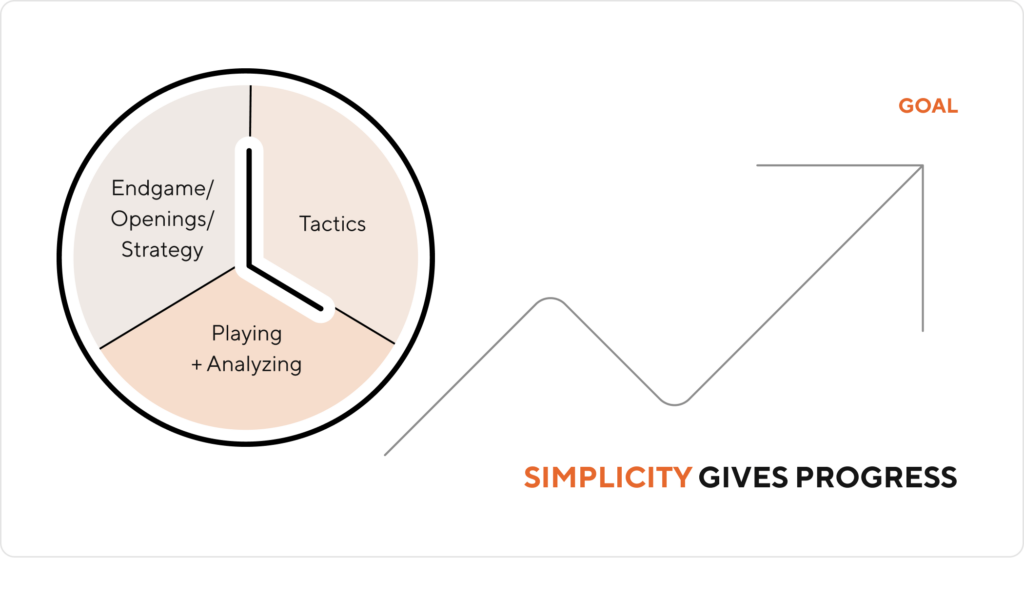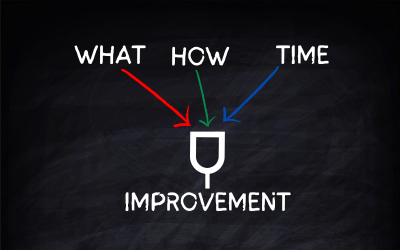Getting better at chess is pretty straightforward.
If you spend time on a few things that really matter, you will be able to improve your chess rather quickly.
In this article, I will share my simple philosophy for chess improvement. It worked for me, 800+ course students, and thousands of readers. It will work for you too.
Here is how to get better at Chess:
The Formula To Get Better At Chess
Many Chess Masters try to make chess improvement look like a mystery. That is what makes us look like geniuses! But let me tell you a secret: it isn’t that complex to get better at chess.
To improve your chess playing strength, and thus also your rating, you need to follow a simple training equation:
What x How x Time = Improvement
Breaking this down in simple words, if you study things that matter (we’ll get to them in a moment), the right way and invest some time, you will see improvements.
Step-by-Step, I will now show you the What and How. The only thing you then have to do is to follow my advice, invest the time, and voilà, you should get better at chess rather quickly.
What To Study To Get Better At Chess
Openings, Tactics, Endgames, Strategy, Playing Games…
There are so many things you could do that might improve your chess. Many get overwhelmed by so many possibilities and end up doing a little bit of everything or nothing at all.
Follow The 1/3 Rule
That’s why I created a very simple rule you can follow to make sure you spend your time wisely. I call it the 1/3 rule. It says that you should each spend 1/3 of your time on:
- Tactics
- Playing + Analyzing Games
- Endgame, Strategy, or Openings

Here is why this works so well.
“Chess is 99% Tactics,” said famous Chess Master Richard Teichmann more than 100 years ago. And he wasn’t that far off. Tactics are what make you lose or win a Chess game. You can play perfectly for 50 moves, then blunder a tactical idea from your opponent and still lose the game.
It only makes sense to spend a decent amount of your time improving your tactical skills. In the “how” section, I show you how exactly you should do that. As I mentioned above, it is actually pretty simple!
The second third of your time should be spent playing and analyzing games. After all, that’s what you train for! Playing games and learning from your mistakes is one of the best ways to improve anything.
Thanks to free analyzing tools, you can test your skills and understand what went wrong. Just remember one very important distinction:
If you play without analyzing, you will NOT improve. Rather, you will repeat the same mistakes over and over again. Which leads to frustration and stagnation.
Make it a habit to analyze your own games, and you will see that this is a big part of getting better at chess.
The last part of your games should be spent on all the other areas of chess, namely openings, endgames & chess strategy.
These parts should not be neglected, but they aren’t as important as tactical skills and learning from your own mistakes by playing games.
Depending on your weaknesses and strengths, you choose one of these 3 parts and dedicated the third third of your chess study time to it. Once you make progress on one part, you can switch your attention to another.
How To Study Chess
Now that you know the first part of the equation, what to study to get better at chess, it is time to learn how exactly you can do it.
No matter what area you are studying, make sure to keep the quality of the training high. That means being as focused as you would be during a real game. Like that, you can multiply the improvement of every single training session.
If you struggle with your focus during chess training, make sure to read my article on high-quality training, which gives you clear and simple steps to follow so you can increase the quality of your chess training.
How To Study Tactics
Getting better at Tactics is done in two steps. First, you learn a new tactical motif, also sometimes referred to as a pattern. Then you try to apply this newly learned pattern in different training situations (puzzles) until you can use your tactical skills in a real game.
The learning part usually happens with the help of a Coach, book, course, or Article. Which means somebody else teaches you something you didn’t know yet. When doing this, ensure you are actively participating and not just reading or listening.
Ask questions if anything is unclear, and try to explain what you just learned in your own words. This is what I refer to as active learning.
Then it is time to practice. This practice will make a big part of your tactical journey. It is actually the “secret” so many masters don’t want to tell you.
We simply practiced different patterns so many times that we are now able to spot them waking up in the middle of the night.
If you never learned and improved tactics before, I recommend you check out the free Lichess practice section. This is where you can learn some of the most common patterns. Then, you can improve on those patterns by using the tactics trainer on the same (free) site.
For those interested in knowing more about getting better at Tactics, I have written a full guide on the best resources and how-to’s to improve your Tactics.
How To Play Games & Analyze Them
Whenever you play a game of chess, try to give your best and enjoy it. There is not much more you can do. Then, win or lose, make it a habit to analyze every game you play. Only like that you can improve your skills step-by-step and avoid making the same mistake several times in a row.
So your question might be: how in the world should I analyze my own games and spot mistakes?
Luckily, we live in a digital world with nearly unlimited possibilities. On the biggest playing sites, namely Chess.com and Lichess, you can analyze your games with a chess computer (called an engine).
It will mercilessly show you where you went wrong. To avoid getting overwhelmed, try to keep this process as simple as possible. Only check for big, game-deciding mistakes.
You can easily do so by going through your games with the Engine on. Whenever there is a huge jump in the evaluation, you found something that needs to be corrected. Just note this big mistake that might have lost you the game and move on.
If you want a step-by-step guide and understand how a Grandmaster analyzes Blitz games, you can read my article on Blitz analysis.
How To Study The Rest
A lot of your improvement on openings, endgames, and Strategy comes from learning from good coaches and players. To keep things simple, spend time on only one of the three areas every week. If you are starting, learn the basics from all three areas. Thanks to the articles below, you can do just that:
- Beginner Chess Strategy
- Opening Principles
- Checkmating the lone King
Then choose the area you are weakest in or most interested in. You can now find a good book, YouTube Video, or Course and start getting better.
Even though this is less difficult than solving tactical exercises or playing games, make sure that your focus is on point. A great strategy you can apply is to teach what you learned to someone weaker than you.
Once you are able to explain an opening idea, strategic maneuver, or checkmate pattern in the endgame, you are sure that you really learned what you just heard/read.
If you want to keep things simple and improve Opening, Endgame & Strategy in one place, I recommend ChessMood. They offer high-quality courses in all three areas, and you can access all of them with a monthly membership.
With my affiliate link, you get 20% off on any monthly or yearly plans. Highly recommended!
Conclusion: How To Get Better At Chess
Getting better at chess is more simple than you might have thought. You need to:
- Spend time on what matters —> 1/3 Rule
- Train the right way
- Put in time & energy
Sure, there will be periods when improving your chess results will seem hard. Your rating graph won’t be a straight line, either. But if you follow the simple steps outlined in this article, you will be able to get better at chess.
